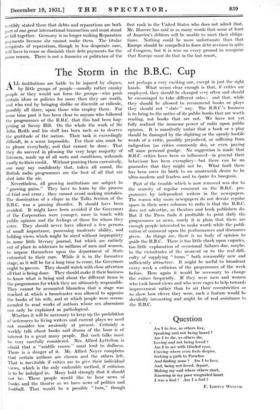The Storm in the B.B.C. Cup A LL institutions are
liable to be injured by cliques, by little groups of people—usually rather cranky people or they would not form the groups—who 'push certain, ideas or policies for more than they are worth, and who end. by bringing dislike or discredit or ridicule, possibly all three, upon those who employ them. For some time past it has been clear to anyone who followed the programmes of the B.B.C. that this had been hap- pening at _Savoy Hill. On the whole the work of Sir John Reitli and his staff has been such as to deserve the gratitude of the nation. Their task is exceedingly difficult, in a sense impossible. For their aim must be to please everybody, and that cannot be done. That they do succeed in pleasing the very large majority of listeners,. made up of all sorts and conditions, redounds vastly to their credit. Without praising them excessively, one may say confidently that, taken all round, the British radio programmes are the best of all that are shot into the air. .
Nevertheless, all growing institutions are subject to "growing pains." They have to learn by the process of trial and error ; they cannot avoid making mistakes. The domination of a clique in. the Talks Section of the B.B.C. was a passing. disorder. It should have been avoided. It might have been avoided if the Governors of the Corporation were younger, more in touch with public, opinion and the feelings of those for whom they cater. They should never have allowed a few persons of small importance, possessing moderate ability, and holding views which might be aired without impropriety in some _little literary journal, but which are entirely out of place in addresses to millions of men and women, to impose themselves upon the department of State entrusted to their care. While it is in the formative stage, as it will be for a long time to come, the Governors ought to govern. They should watch with close attention all that is being done. They should make it their business to know :what is being said about the different items in the programmes for which they are ultimately responsible. They cannot be accounted blameless that a stage was reached at which a broadcaster was allowed to appraise the books of his wife, and at which people were recom- mended to read works of authors whose sex obsessions can only , be explained as pathological. Whether it will be necessary to keep up the prohibition of ?references to living writers and current plays we need not consider too anxiously at present. Certainly a weekly' talk about books and drama of the hour is of interest to a great many people. But such talks must be very .carefully considered. Mrs. Alfred Lyttelton is afraid that a,. "middle course" must lend to dullness. There is _a danger of it. Mr. Alfred Noyes complains that certain authors are chosen and the others left. That is inevitable if critics are , to give their individual views, which is the only endurable method, if criticism is to be indulged in. Many hold strongly that it should not be. These people would like to hear news of books and:the theatre as we have news of politics and football. That would be a possible ." turn," though not perhaps a very exciting one, except in just the right hands. What seems clear enough is that, if critics are employed, they should be changed very often and should be encouraged to take different sides ; and that, while they should be allowed to recommend books or plays they should not " slate " any. The B.B.C.'s business is to bring to the notice of its public books that are worth reading, not books that are not. We have not yet fully realized the immense power of radio upon public opinion. It is manifestly unfair that a book or a play should be damaged by the slighting or the openly hostile words of a critic, possibly prejudiced, or suffering from indigestion (as critics commonly do), or even paying off some personal grudge. No suggestion is Made that B.B.C. critics have been so influenced—in general their behaviour has been exemplary—but there can be no guarantee that they might not be. What fault there has been owes its birth to an amateurish desire to be ultra-modern and fearless and to epaler les bourgeois.
Part of the trouble which is now removed was due to the scarcity of regular comment on the B.B.C. pro- grammes by independent writers in the newspapers. The reason why more newspapers do not devote regular space in their news .columns to radio is that the B.B.C. does not advertize, as theatres and book publishers do. But if the Press finds it profitable to print daily the programmes as news, surely it is plain that there are enough people interested to make worth while the publi- cation of comment upon the performances and discourses given. As things are, there is no body of opinion to guide the B.B.C. There is too little check upon vagaries, too little explanation of occasional failures due, maybe, to the vicissitudes of the moment or to the real diffi- culty of supplying " turns " both reasonably new and sufficiently attractive. It might be useful to broadcast every week a criticism of the programmes of the week before. Here again it would be necessary to change the critics frequently. If they were men and women who took broad views and who were eager to help towards improvement rather than to air their eccentricities or to show how clever they were, such a feature would be decidedly interesting and might be of real assistance to the B.B.C.


































 Previous page
Previous page